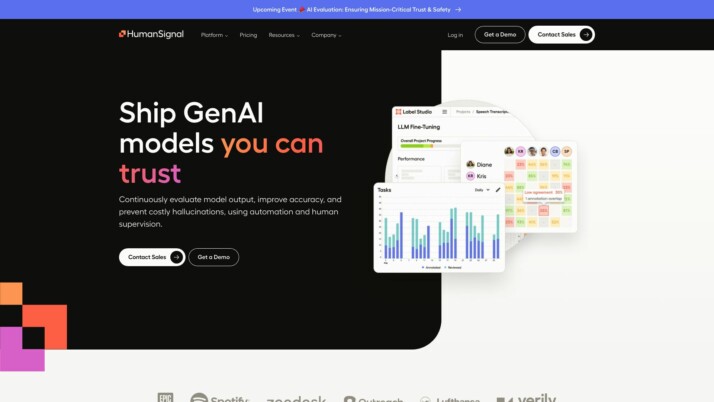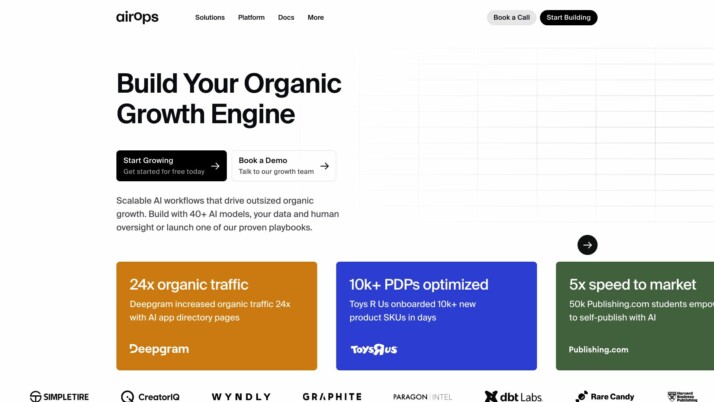In today’s rapidly evolving AI landscape, businesses and organizations are constantly seeking powerful yet accessible solutions to harness the potential of this cutting-edge technology. As we explore the capabilities of Adala vs. AirOps, and SmythOS, we aim to provide a comprehensive comparison that will guide readers in making informed decisions about their AI implementation strategies.
Whether you’re seeking to optimize data labeling processes, streamline business operations, or unlock the full potential of AI across diverse use cases, this review will shed light on the strengths and limitations of each platform. Join us on this insightful journey as we dive into the features, deployment options, and real-world applications of these innovative AI solutions.
Adala Overview
Adala is an open-source framework designed to create autonomous data labeling agents. These agents leverage large language models like GPT-3 to acquire specialized skills such as text classification, summarization, and question answering. One of Adala’s core strengths is its ability to learn and improve continuously through interactions with data and human feedback.
The framework follows a modular architecture, enabling users to contribute skills, datasets, and environments. Agents can learn from labeled ground truth data provided by users, guiding the training process. Additionally, Adala facilitates human-in-the-loop feedback mechanisms, allowing users to refine the agents’ skills for reliable and adaptable results.


Adala’s primary objective is to increase the efficiency and reduce the costs associated with data labeling tasks while maintaining high quality through human guidance. Its open-source nature and community-driven approach foster collaboration and innovation within the field of autonomous data labeling agents.
AirOps Overview
AirOps is a commercial platform designed to help businesses build and scale AI workflows for driving significant organic growth. The platform offers a range of features that allow users to create and implement AI-powered workflows utilizing over 40 AI models, their own data, and human oversight.
One of the key strengths of AirOps is its ability to handle large volumes of tasks efficiently through scalable AI workflows. This is particularly beneficial for companies looking to optimize their processes and reduce manual effort. The platform also provides proven playbooks that have been tested and proven to drive results in various scenarios, such as increasing organic traffic, improving product listing quality, and enhancing content creation.


AirOps showcases several case studies where their platform has significantly boosted metrics like organic traffic, speed to market, and conversion rates.
For example, Deepgram increased their organic traffic by 24 times using AirOps. The platform is designed to be flexible and integrative, allowing users to incorporate text, image, and transcription models along with data retrieval and human review steps into their workflows.
Feature Comparison
Adala and AirOps are two distinct platforms designed for different purposes. While Adala is an open-source framework focused on creating autonomous data labeling agents, AirOps is a commercial platform aimed at building and scaling AI workflows for driving business growth.
One key difference lies in their approach to agent deployment. Adala does not appear to provide hosted environments for deploying agents in development or production stages. In contrast, AirOps offers robust deployment options, including hosting agents in separate development and production environments. Additionally, AirOps supports a visual builder and a no-code interface, making it more accessible to non-technical users compared to Adala’s code-based implementation.
Another significant gap is AirOps’ comprehensive feature set for building AI workflows.
It includes capabilities such as autonomous agents, explainability and transparency tools, debug modes, multimodal support, and multi-agent collaboration. Adala, on the other hand, primarily focuses on data labeling tasks with limited support for these advanced features.
Furthermore, AirOps provides a range of deployment options, including APIs, webhooks, staging domains, and production domains, along with robust security features like data encryption, OAuth, and IP control. Adala does not offer similar deployment and security capabilities, as it is primarily designed as a framework for developing data labeling agents.
In terms of components and integrations, AirOps supports a wide array of AI models, APIs, and data sources, including foundation models, Hugging Face models, Zapier APIs, and integration with data lakes. Adala’s integrations are more limited, primarily focused on the OpenAI API for its natural language processing capabilities.
Overall, while Adala is a specialized open-source framework for data labeling tasks, AirOps emerges as a more comprehensive and feature-rich platform for building and deploying AI workflows across various business use cases, offering robust deployment options, security features, and a wide range of integrations.
| Adala | AirOps | SmythOS | |
|---|---|---|---|
| CORE FEATURES | |||
| Explainability & Transparency | ❌ | ✅ | ✅ |
| Autonomous Agents | ❌ | ✅ | ✅ |
| Visual Builder | ❌ | ✅ | ✅ |
| Audit Logs for Analytics | ❌ | ✅ | ✅ |
| SECURITY | |||
| IP Control | ❌ | ✅ | ✅ |
| COMPONENTS | |||
| Huggingface AIs | ❌ | ✅ | ✅ |
| DEPLOYMENT OPTIONS | |||
| Deploy as Webhook | ❌ | ✅ | ✅ |
| Deploy as Site Chat | ❌ | ✅ | ✅ |
| DATA LAKE SUPPORT | |||
| Sitemap Crawler | ❌ | ✅ | ✅ |
| YouTube Transcript Crawler | ❌ | ✅ | ✅ |
Best Alternative
While both Adala and AirOps offer innovative and powerful capabilities in their respective domains, SmythOS emerges as the superior alternative for building and deploying AI agents across a wide range of use cases. SmythOS provides a comprehensive and user-friendly platform that streamlines the entire process of creating, integrating, and deploying AI agents, empowering users with extensive features that surpass the limitations of Adala and AirOps.
With its intuitive drag-and-drop interface, SmythOS enables users to effortlessly construct complex AI workflows without the need for extensive coding knowledge. This democratizes AI development, making it accessible to a broader audience, including non-technical professionals and small businesses. Additionally, SmythOS offers robust deployment options, allowing agents to be deployed as APIs, webhooks, site chatbots, and even as GPT plugins or Alexa skills, ensuring seamless integration into existing systems and workflows.
Moreover, SmythOS excels in providing advanced features that address the gaps found in Adala and AirOps. Its support for autonomous agents, explainability and transparency tools, debugging modes, and multi-agent collaboration capabilities empower users to build and manage sophisticated AI solutions with ease. The platform’s extensive integration ecosystem, including foundation models like GPT, Hugging Face models, Zapier APIs, and various data sources, ensures that users have access to a vast array of AI capabilities and tools.
SmythOS emerges as a pioneering platform that empowers businesses and individuals to harness the power of artificial intelligence with unprecedented ease and flexibility.
Conclusion
In the rapidly evolving world of AI, SmythOS emerges as a pioneering platform that empowers businesses and individuals to harness the power of artificial intelligence with unprecedented ease and flexibility. With its intuitive drag-and-drop interface, extensive integration ecosystem, and support for a vast array of AI models, SmythOS democratizes AI development, making it accessible to users of all technical backgrounds.
One of the standout features of SmythOS is its ability to orchestrate multi-agent systems, enabling teams of AI agents to collaborate seamlessly on complex tasks. This collaborative approach not only enhances efficiency but also unlocks new possibilities for tackling intricate challenges that were once deemed insurmountable.
Furthermore, SmythOS offers unparalleled deployment options, allowing agents to be seamlessly integrated into existing workflows and systems. Whether you need to deploy agents as APIs, webhooks, site chatbots, or even as GPT plugins or Alexa skills, SmythOS has you covered. This versatility ensures that your AI solutions can adapt to the ever-changing demands of your business, future-proofing your investments.
If you’re ready to embark on a journey of AI-driven innovation and automation, explore SmythOS’ extensive library of templates and get started with a free account today. Unlock the full potential of AI and revolutionize your workflows with SmythOS, the ultimate platform for building and deploying cutting-edge AI agents.
Last updated:
Disclaimer: The information presented in this article is for general informational purposes only and is provided as is. While we strive to keep the content up-to-date and accurate, we make no representations or warranties of any kind, express or implied, about the completeness, accuracy, reliability, suitability, or availability of the information contained in this article.
Any reliance you place on such information is strictly at your own risk. We reserve the right to make additions, deletions, or modifications to the contents of this article at any time without prior notice.
In no event will we be liable for any loss or damage including without limitation, indirect or consequential loss or damage, or any loss or damage whatsoever arising from loss of data, profits, or any other loss not specified herein arising out of, or in connection with, the use of this article.
Despite our best efforts, this article may contain oversights, errors, or omissions. If you notice any inaccuracies or have concerns about the content, please report them through our content feedback form. Your input helps us maintain the quality and reliability of our information.
Alexander De Ridder
Co-Founder, Visionary, and CTO at SmythOS. Alexander crafts AI tools and solutions for enterprises and the web. He is a smart creative, a builder of amazing things. He loves to study “how” and “why” humans and AI make decisions.
Explore All Comparison Articles
Decisions vs. Sola: AI Workflow Automation Showdown
AI-powered workflow automation platforms revolutionize how businesses streamline operations and boost productivity. This comparison explores Decisions vs. Sola, and SmythOS,…
DeepOpinion vs. Sola: Comparing AI Automation Platforms
AI-powered automation platforms revolutionize business operations, but choosing the right solution can be challenging. This comparison of DeepOpinion vs. Sola,…
DevGPT vs. Sola: AI-Powered Development Tools Compared
AI-powered development tools revolutionize software creation, offering unprecedented efficiency and capabilities. This comprehensive review compares DevGPT vs. Sola, and SmythOS,…
Fine AI vs. Sola: Comparing AI Automation Tools
AI-powered automation transforms software development and business workflows, offering unprecedented efficiency and innovation. Fine AI vs. Sola present distinct approaches…
FlowiseAI vs. Sola: Comparing AI Automation Platforms
AI-powered automation revolutionizes business operations, driving efficiency and innovation across industries. FlowiseAI vs. Sola offer distinct approaches to harness this…
Gooey AI vs. Sola: AI-Powered Automation Platforms Compared
AI-powered automation platforms revolutionize how businesses streamline operations and enhance productivity. This comparison delves into Gooey AI vs. Sola, two…

